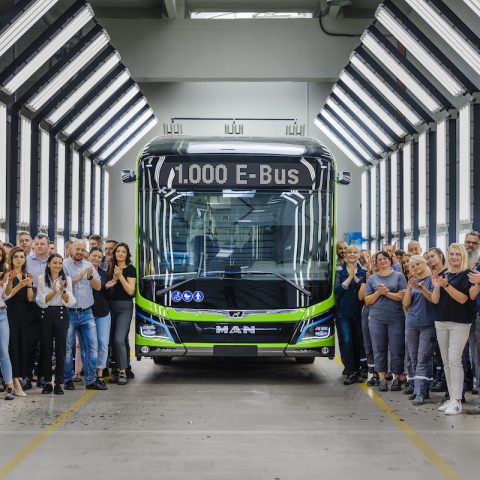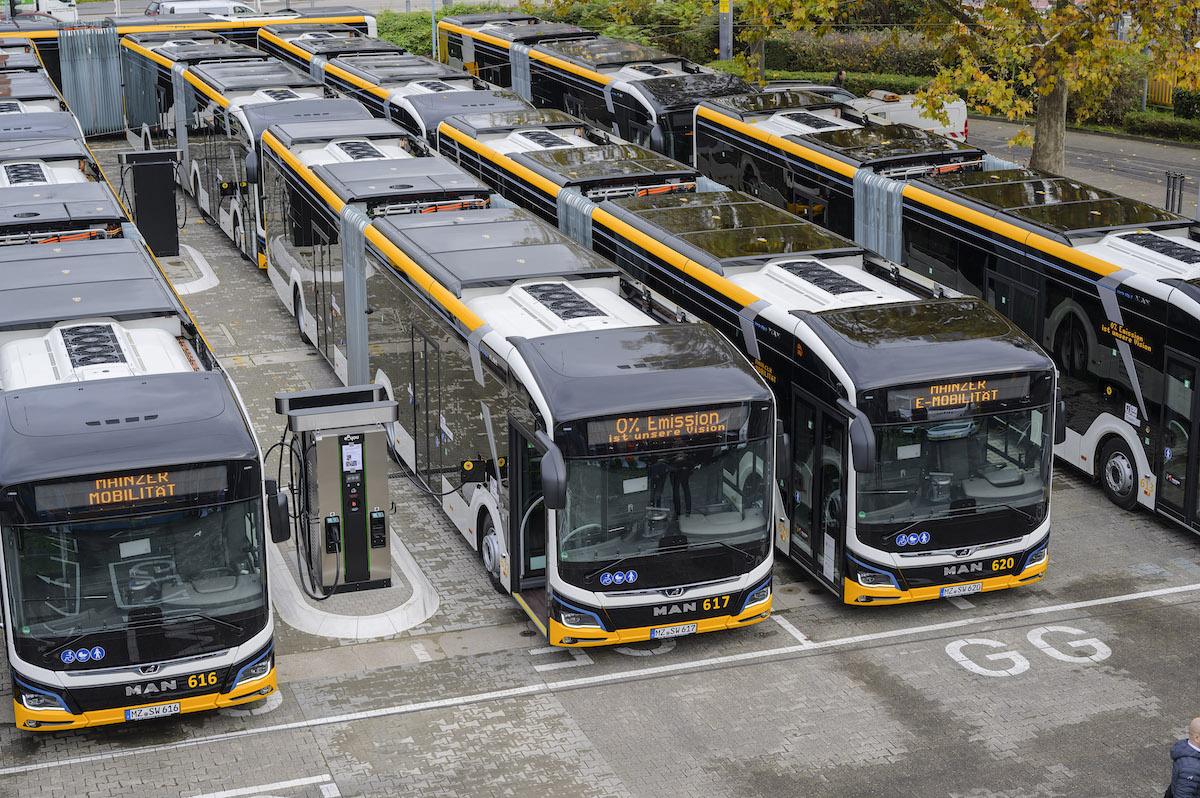MAN has produced 1,000 electric buses so far
In mid-September, the 1,000th MAN Lion’s City E rolled off the production line at the MAN plant in Starachowice, Poland, the group states. In the future, the Lion’s City 12 E will be deployed in Madrid, as the vehicles has just been order by the transport company Auto Periferia S.A., a subsidiary of the Spanish […]

In mid-September, the 1,000th MAN Lion’s City E rolled off the production line at the MAN plant in Starachowice, Poland, the group states.
In the future, the Lion’s City 12 E will be deployed in Madrid, as the vehicles has just been order by the transport company Auto Periferia S.A., a subsidiary of the Spanish Grupo Ruiz.
MAN ranks 2nd in e-bus market in H1 2023
Across Europe, the market for electric buses grew by 45% in the first half of 2023. A total of 2,567 battery-electric buses were registered during the period, according to Chatrou CME Solutions. This means that more than one in three new city buses (37.5 percent) in Europe is now emission-free.
With 260 eBuses, MAN Truck & Bus ranks second in terms of new registrations in Europe. And MAN e-buses are also proving extremely popular in the German market: of the 297 new electric buses registered in Germany in the first six months of this year, 63 were from MAN.
“By 2025, half of our new city buses will be electric, and just five years later, up to 90 percent of our buses in Europe will be battery-powered. We also have our sights set on the electrification of intercity buses and coaches.”, says Barbaros Oktay, Head of Bus at MAN Truck & Bus.
MAN: batteries produced in Nuremberg
The high-voltage batteries for the electric buses and trucks will be mass-produced in Nuremberg from the beginning of 2025. MAN is investing around 100 million euros in this over the next five years (and received a 24-million euros grant from German Federal government). The aim is to expand production capacity to over 100,000 batteries per year, that could be used to equip around 15,000 to 25,000 e-buses or e-trucks – depending on the configuration.
In addition, the charging infrastructure is to be expanded as part of the Milence joint venture, which the TRATON Group founded together with Daimler Truck and the Volvo Group: the plan is to set up at least 1,700 high-performance charging points at or near freeways and logistics hubs across Europe in the next few years.
A story that started in Hamburg
MAN Truck & Bus already received its first e-bus order at the end of 2019 – a year before the start of production: Verkehrsbetriebe Hamburg-Holstein (VHH) ordered 17 MAN Lion’s City E. Since then, VHH has been consistently pursuing its path toward a completely zero-emission bus fleet.
The next order covered a further 20 electric buses. In 2022, VHH opted for eBuses from MAN for the third time: the order included 30 eSolobuses and 6 eArticulated buses. The latest order from this year includes the delivery of up to 100 more electric buses by MAN Truck & Bus.

MAN Lion’s City E: focus on Spain
Back to the latest order achieved in the Spanish market, Grupo Ruiz – incidentally the first Spanish customer to order MAN electric buses – also already has 20 MAN e-buses in operation, and plans to have 60 vehicles by the end of 2023. In the meantime, however, the company is by no means the only public transport operator in Spain to rely on the MAN Lion’s City E – on the contrary: to date, more than 175 MAN e-buses have been ordered for Spanish cities such as Alicante, Badajoz, Bilbao, Cáceres, Leganés, Málaga, Melilla, San Sebastián, and Valencia. The majority of the vehicles are to be delivered and put into service this year.
Over 370 MAN e-buses to be in operation in Scandinavia
Scandinavia in particular is regarded as one of the pioneers when it comes to electromobility. This is also reflected in the order figures: by the end of 2023, more than 370 electrically powered MAN city buses are expected to be in operation here. The latest orders include 45 MAN Lion’s City 12 E buses ordered by VIKINGBUS Danmark A/S. In the future, the transport company will operate routes in Copenhagen as well as in Frederiksberg, Lyngby, Greve, and Høje Taastrup in Denmark. Anchersen A/S had already ordered 25 eBuses from MAN in 2021, which are now in use on the central Copenhagen bus route 7A. “But our MAN Lion’s City E has also been excellently received in Norway and Sweden. For example, the Norwegian transport operator Unibuss, among others, has ordered 76 MAN Lion’s City E from us,” says Robert Katzer, Head of Sales & Product Bus at MAN Truck & Bus.
Three years in production for the MAN Lion’s City E
“Almost exactly three years ago – at the beginning of October 2020 – series production for our battery-electric city buses successfully started in Starachowice. Since then, more and more e-buses have been reliably rolling off the production line,” says Barbaros Oktay, Head of Bus at MAN Truck & Bus, adding, “We have a great team to thank for this, who are tirelessly committed and deliver outstanding work. In addition, our plant in Poland has developed into a center of excellence for electric city buses in recent years.”
“Orders, such as the current one from Grupo Ruiz, and the demand from our customers clearly show that our Lion’s City E is becoming increasingly popular,” makes Robert Katzer, Head of Sales & Product Bus at MAN Truck & Bus, clear, adding, “The many follow-up orders in particular prove how satisfied operators are with the vehicle.”
MAN on the way to net zero
MAN therefore aims to become greenhouse gas neutral in terms of its balance sheet by 2050 at the latest. To achieve its ambitious climate targets, MAN Truck & Bus is focusing primarily on the electrification of the products it sells, which are responsible for around 97% of the company’s CO2 emissions. “On our way to zero emissions, we are relying fully on electric drive in the bus business. To this end, we are consistently converting our portfolio in the city bus and intercity segment to electric vehicles over the next few years,” Oktay makes clear. Incidentally, MAN is also focusing on battery-electric drives because the vehicles are economically convincing. “BEV simply offers the best TCO for our customers. That’s why we’re also focusing on the electric variant for coaches in the next step.”







